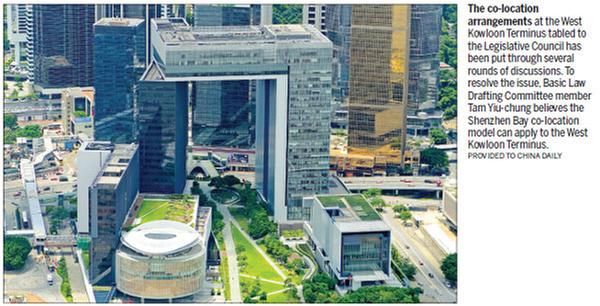Co-location of border facilities 'legally viable' at West Kowloon Terminus

Tam Yiu-chung, former chairman of the Democratic Alliance for the Betterment and Progress of Hong Kong, sees Chief Executive-designate Carrie Lam Cheng Yuet-ngor facing several political tasks in the early days of her administration.
The co-location arrangement for the Hong Kong section of the Guangzhou-Shenzhen-Hong Kong Express Rail Link is a "political hot potato". To resolve the issue, He believes the Shenzhen Bay co-location model can apply to the West Kowloon Terminus.
After the Hong Kong and mainland governments have agreed to implement a co-location system, they can seek the approval of the National People's Congress Standing Committee (NPCSC) by way of a resolution.

Both governments can then make laws to implement co-location, permitting mainland officers to execute customs, immigration and quarantine laws within a designated area of the terminus.
People breaking local laws shall be handed to Hong Kong police, he said. People wanted by the mainland may be arrested after the trains leave Hong Kong. Those not welcome on the mainland may be refused permission to board trains.
Unfortunately "pan-democrats" oppose the arrangement, saying the Basic Law does not provide for execution of mainland laws in Hong Kong.
Tam agreed there should be a legal basis for the co-location system. Yet when the Basic Law was drawn up in the 1980s, there was not any notion of such an express railway.
"The law shall move ahead with the times to benefit cross-boundary passengers," said the former Basic Law co-drafter. "While we can get over the problem by having the NPCSC authorization and the pertinent laws enacted by the Hong Kong and mainland authorities."
Tam also pointed out the Basic Law is silent on Hong Kong officers implementing laws on the mainland. It was the NPCSC which in 2006 passed a resolution to authorize law enforcement on the mainland by Hong Kong officers at the Shenzhen Bay Control Point.
Tam finds it very interesting that the opposition suddenly seems to conform to the Basic Law. If they truly obey the law, he wonders why they insist on "public nomination" of CE election candidates, which is totally non-existent in the Basic Law.
Tam guesses the opposition will press for reopening of political reform, even though it was them who vetoed the reform package and robbed Hong Kong people of the chance to choose the CE in this year's election by "one person, one vote".
He believes Lam will not reopen political reform unless the "pan-democrats" agree to comply with the constitutional framework the NPCSC set out on Aug 31, 2014.
"It will be a waste of time if they persist in reopening political reform while opposing the Aug 31 decision," he said, adding that the central government will not revise the framework.
Tam also thinks Lam's administration should enact the national security law under Article 23 of the Basic Law to curb the activities of those seeking Hong Kong independence. He suggests the Hong Kong government explain issues clearly when it re-introduces Article 23 legislation and tells people not to worry because it will not target ordinary citizens.
joseph@chinadailyhk.com

(HK Edition 06/23/2017 page4)
Today's Top News
- China sees 2.8b cross-regional trips during Spring Festival holiday
- China adds 20 Japanese entities to export control list
- Nianhuo rush sparks spending
- Travel volumes set to hit new highs as holidayers return
- Popular Sinology bridges cultural understanding
- Nation boosts laws for economic growth






























